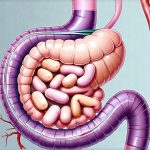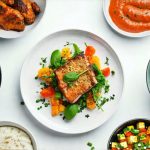The satisfying crunch of fried chicken, the comforting warmth of pizza, the sheer convenience of a burger and fries – greasy takeout meals are undeniably appealing. They represent quick solutions in our busy lives, offering flavors that often hit the spot. However, for many people, these culinary delights frequently come with an unwelcome side effect: indigestion. That uncomfortable feeling of fullness, bloating, heartburn, or general stomach upset can quickly overshadow the initial enjoyment of the meal. Understanding why greasy foods cause such distress is more complex than simply blaming the fat content; it involves a cascade of physiological processes and how our digestive system responds to specific food characteristics.
Indigestion isn’t typically a serious medical condition in itself, but persistent or severe indigestion can significantly impact quality of life. It’s often linked to lifestyle factors like dietary choices, stress levels, and eating habits. Greasy takeout foods frequently exacerbate these issues due to their composition – high fat content, processed ingredients, and potential lack of fiber. This article delves into the intricacies of why these meals so commonly lead to digestive discomfort, exploring the physiological mechanisms at play and offering insights into mitigating those unwanted effects. We’ll move beyond simple explanations to explore the interplay between food characteristics, digestion, and individual sensitivities, providing a more comprehensive understanding of this common experience. If you frequently find yourself uncomfortable after eating, it may be time to consider what to test when meals feel like they ‘sit heavy’.
The Role of Fat Content & Digestive Slowdown
The primary culprit behind indigestion from greasy takeout often centers around the sheer amount of fat present. While our bodies need some fat for essential functions – absorbing vitamins, hormone production, and cell growth – excessive amounts can overwhelm the digestive system. Fat is the slowest macronutrient to digest; it requires a more complex process than breaking down carbohydrates or proteins. This prolonged digestion means food stays in the stomach longer, increasing the likelihood of discomfort. – A higher fat content delays gastric emptying, which is the rate at which food moves from the stomach into the small intestine. – This delay can lead to feelings of fullness and bloating, even after relatively small portions. – The longer transit time also increases exposure to digestive acids, potentially contributing to heartburn or acid reflux.
Furthermore, the type of fat matters significantly. Takeout foods often utilize highly processed oils – vegetable oil, soybean oil, hydrogenated oils – which can be more difficult for the body to break down compared to healthier fats like olive oil or avocado oil. Trans fats, frequently found in fried foods, are particularly problematic as they’ve been linked to numerous health concerns and can further disrupt digestive processes. The combination of quantity and quality of fat significantly impacts how easily (or uneasily) our bodies process these meals. Often times, this discomfort leads people to why skipping meals may lead to bloating later as they try and adjust their eating habits.
The body responds to high-fat intake by releasing hormones that stimulate the gallbladder to contract and release bile, which helps emulsify fats for digestion. However, consistently overwhelming the system with large amounts of fat can lead to sluggish gallbladder function over time, further exacerbating digestive issues. It’s a vicious cycle where frequent indulgence leads to decreased efficiency. Ultimately, excessive fat intake slows down digestion, increases stomach fullness, and potentially contributes to acid reflux or heartburn.
Understanding Gastric Emptying & Motility
Gastric emptying isn’t just about how long food stays in the stomach; it’s intricately linked to motility, which refers to the contractions of the digestive tract that move food along. High-fat meals significantly impact gastric motility, reducing its overall rate. This reduction is a natural physiological response – the body slows down digestion to allow sufficient time for fat absorption. However, if this slowdown becomes excessive or frequent, it can lead to discomfort and indigestion. – Factors influencing gastric emptying include the volume of food, its composition (fat, protein, carbohydrates), and individual factors like stress levels. – Certain medications can also affect gastric motility, potentially exacerbating digestive issues.
The stomach isn’t a passive holding tank; it actively mixes and churns food with gastric juices to break it down. When overloaded with fat, this churning action becomes less effective, leading to incomplete digestion. This incomplete digestion not only causes discomfort but also means that nutrients aren’t absorbed as efficiently. The digestive system attempts to compensate by increasing acid production, which can contribute to heartburn or gastroesophageal reflux disease (GERD) in susceptible individuals.
The interplay between gastric emptying and motility highlights the delicate balance within our digestive system. Disrupting this balance – through frequent high-fat meals – can have cascading effects on overall digestive health and comfort. Restoring a healthy rate of gastric emptying is key to alleviating indigestion. A good starting point may be reviewing how to prepare meals to reduce indigestion to help with this process.
The Impact of Processing & Additives
Beyond fat content, the processed nature of many takeout foods plays a substantial role in causing indigestion. These meals often contain numerous additives, preservatives, and artificial ingredients that can irritate the digestive system. – Monosodium glutamate (MSG), a common flavor enhancer, is known to cause sensitivity in some individuals leading to bloating, gas, and even headaches. – Artificial sweeteners and coloring agents can also disrupt gut flora and contribute to digestive discomfort. – High levels of sodium frequently found in processed foods can lead to water retention and bloating.
The lack of fiber in many takeout meals further exacerbates the problem. Fiber adds bulk to stool, promotes regularity, and aids in digestion. Without sufficient fiber, food moves through the digestive tract too quickly or becomes impacted, leading to constipation or diarrhea – both contributing to indigestion. Takeout foods typically prioritize flavor and convenience over nutritional value, resulting in a significant lack of essential nutrients like fiber.
The combination of processing, additives, and low fiber content creates a perfect storm for digestive upset. These factors not only slow down digestion but also actively irritate the gut lining, leading to inflammation and discomfort. Minimizing processed foods and increasing fiber intake are crucial steps towards improving digestive health. Sometimes, even hard stools linked to bland and repetitive meals can contribute to these issues.
Lifestyle Factors & Mitigation Strategies
Indigestion from greasy takeout isn’t solely determined by the food itself; lifestyle factors significantly influence our susceptibility. Stress, for instance, can dramatically impact digestion, slowing down motility and increasing acid production. Eating quickly without proper chewing also hinders digestion, forcing the stomach to work harder. – Practicing mindful eating – savoring each bite and chewing thoroughly – can greatly improve digestion. – Managing stress through techniques like meditation, yoga, or deep breathing exercises can reduce digestive symptoms.
Hydration plays a crucial role too. Drinking plenty of water helps soften stool and promotes regularity. Avoiding carbonated beverages during meals can also prevent bloating. Simple strategies such as portion control are effective; consuming smaller portions reduces the burden on the digestive system. – Consider opting for grilled or baked options instead of fried when ordering takeout. – Request modifications to reduce oil content or sodium levels whenever possible. It is important to note that why some cold medications lead to temporary bloating can also mimic indigestion symptoms and should be considered.
Ultimately, understanding the interplay between food choices and lifestyle factors is essential for mitigating indigestion. While completely eliminating greasy takeout may not be realistic (or desirable) for everyone, making informed choices and adopting healthy habits can significantly improve digestive comfort and overall well-being. Taking control of your dietary habits and managing stress levels are powerful tools in preventing indigestion. Also consider pre-workout meals that don’t lead to abdominal fullness as a way to regulate digestion throughout the day.


















